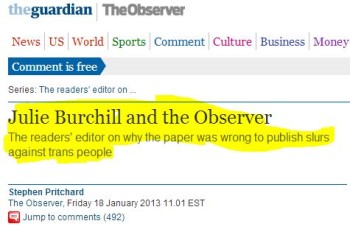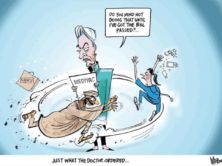
A screenshot from the Observer's readers' editor's January column on Julie Burchill's transgender comments. (Credit: the Obesrver, screenshot, highlight added)
Even though complainants in the U.K. found the Observer’s column about transgender people was “offensive,” the Press Complaints Commission ruled that the column didn’t break the PCC’s Editors Code.
As iMediaEthics has written, in a January column, the Observer’s Julie Burchill called transgender people “bed-wetters in bad wigs,” “dicks in chicks’ clothing,” and so on. Burchill’s column was in response to criticism of her friend Suzanne Moore’s writings on “women’s anger.”
More than 800 complaints were filed with the Press Complaints Commission over the column, which the Observer unpublished. The Observer’s editor John Mulholland explained the unpublishing was “in light of the hurt and offence caused,” and the Observer’s readers’ editor Stephen Pritchard said he got 1,000 emails about the column. In addition, a protest was staged outside the Observer‘s offices.
According to the ruling, published on the blog Challenging Journeys, the PCC looked at complaints against both the initial publication by the Observer and the later publication by the Telegraph, which posted the column on its website after the Observer deleted it. The PCC’s Catherine Speller told iMediaEthics that “a summary of the complaint will be published on the PCC website (in the monthly complaints summaries section http://www.pcc.org.uk/cases/monthlycomplaintssumarries.html) in due course.”
Complaints focused on the PCC’s code against discrimination and accuracy, as well as “concerns…that the repeated use of terms of offence” were harassment.
The PCC decided that the column didn’t violate the discrimination clause because the column was generalized and didn’t target one person. The discrimination clause advises against using “prejudicial or pejorative reference to an individual’s race, colour, religion, gender, sexual orientation or to any physical or mental illness or disability.”
The PCC’s ruling explains:
“The clause does not cover references to groups or categories of people. The language used in the article did not refer to any identifiable individual, but to transgender people generally. While the Commission acknowledged the depth of the complainants’ concerns about the terminology used, in the absence of reference to a particular individual, there was no breach of Clause 12.”
Further, the PCC ruled that Burchill’s column wasn’t “inaccurate or misleading” because it was an opinion column and not a news report. And, since Burchill’s comments were made in “a single comment piece,” the PCC decided it wasn’t harassment.
iMediaEthics has written to the Telegraph and the Observer seeking comment in response to the ruling. We’ll update with any response.






